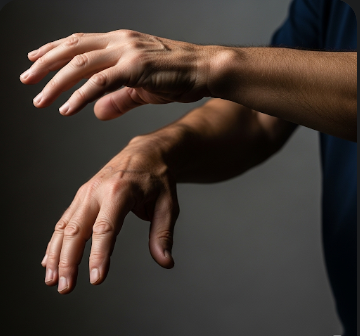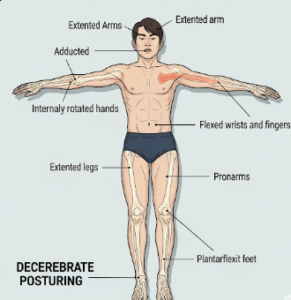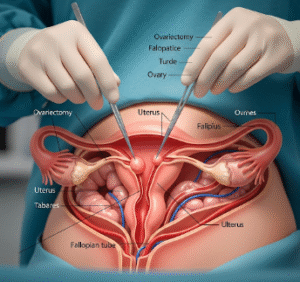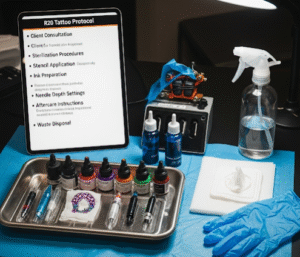Overview
Asterixis, often referred to as a “flapping tremor”, is a neurological sign characterized by sudden, brief, involuntary jerking movements, most commonly observed in the hands and wrists when the arms are extended and wrists dorsiflexed. It is an important clinical indicator of metabolic encephalopathy, particularly in liver disease, but can also occur in conditions affecting the kidneys, lungs, or brain.
In South Korea, neurology and hepatology clinics routinely assess asterixis as part of neurological and systemic evaluations. Detecting this sign early can help clinicians identify underlying metabolic disturbances and initiate timely treatment to prevent progression.
Key Facts
Highlights:
➡️ Asterixis presents as a sudden, flapping, or jerking motion of the hands or arms when extended.
➡️ Most commonly associated with hepatic encephalopathy but can also occur in uremia, hypercapnia, or drug-induced metabolic disturbances.
➡️ It is considered a motor sign of negative myoclonus, reflecting transient loss of postural muscle tone.
➡️ Usually reversible once the underlying metabolic or systemic cause is addressed.
➡️ South Korean clinics use clinical examination, laboratory tests, and imaging to determine the cause of asterixis.
What is Asterixis?
Asterixis is a neurological sign rather than a disease itself, indicating impaired central nervous system function. It is most easily detected with the following method:
- The patient extends both arms forward at shoulder height.
- Wrists are dorsiflexed, with fingers spread.
- The clinician observes for rapid, brief, involuntary downward flapping movements of the hands or fingers.
The phenomenon is also called a “liver flap” when associated with hepatic encephalopathy.
What Symptoms are Related to Asterixis?
Symptoms of asterixis are primarily motor signs, but they often coexist with systemic manifestations of the underlying condition:
- Flapping tremor of the hands or wrists
- Occasional tremors in the feet, tongue, or eyelids
- Fatigue or lethargy associated with metabolic encephalopathy
- Confusion, disorientation, or altered mental status in severe cases
- Jaundice, edema, or other signs of liver disease if hepatic in origin
- Nausea, vomiting, or uremic symptoms if related to kidney dysfunction
What Causes / Possible Causes of Asterixis?
Highlights:
➡️ Hepatic Encephalopathy: Most common cause, resulting from liver failure or cirrhosis leading to ammonia accumulation.
➡️ Uremia: Advanced kidney disease with accumulation of toxins affecting the nervous system.
➡️ Respiratory Failure / Hypercapnia: Elevated CO₂ levels can impair central nervous system function.
➡️ Drug-Induced Causes: Certain medications like phenytoin, barbiturates, or sedatives.
➡️ Metabolic Disturbances: Electrolyte imbalances such as hypokalemia, hypomagnesemia, or hypocalcemia.
➡️ Other Conditions: Wilson’s disease, myxedema, or severe infections affecting CNS function.
When Should I See My Doctor?
Highlights:
➡️ If you notice involuntary flapping of the hands or arms, particularly when extending them forward.
➡️ If accompanied by confusion, drowsiness, or altered mental status.
➡️ For evaluation of underlying liver, kidney, or respiratory conditions.
➡️ If medication changes or metabolic imbalances could be contributing.
➡️ Early assessment can prevent progression to severe encephalopathy or systemic complications.
➡️ Prompt medical attention is crucial when asterixis is observed in patients with chronic liver or kidney disease.
Care and Treatment
Management of asterixis focuses on treating the underlying condition, as the tremor itself is a sign rather than the primary disease.
Highlights:
➡️ Hepatic Causes: Address liver failure with dietary protein restriction, lactulose therapy, and medications to reduce ammonia levels.
➡️ Renal Causes: Dialysis or kidney function optimization for uremic patients.
➡️ Respiratory Causes: Treat hypercapnia with oxygen therapy, ventilation support, or addressing lung disease.
➡️ Medication Adjustment: Discontinuing or modifying drugs that contribute to metabolic disturbances.
➡️ Electrolyte Correction: Restore potassium, calcium, and magnesium balance as necessary.
➡️ Neurological Monitoring: Observe for progression or resolution of tremors during treatment.
➡️ Patient Education: Understanding that asterixis is reversible and linked to systemic health conditions.
Treatment Options in Korea
South Korea offers advanced care for asterixis through hospitals and specialized clinics:
Highlights:
➡️ Neurology and Hepatology Clinics: Clinical assessment and detection of flapping tremors.
➡️ Laboratory Testing: Liver function tests, kidney function tests, ammonia levels, and electrolytes.
➡️ Imaging: Brain MRI or CT if central nervous system involvement is suspected.
➡️ Dialysis Centers: Management of uremic asterixis through hemodialysis or peritoneal dialysis.
➡️ Medication Management: Expert guidance on lactulose, antibiotics, or adjustment of CNS-active drugs.
➡️ Integrated Multidisciplinary Care: Collaboration between neurologists, hepatologists, nephrologists, and critical care teams.
➡️ Medical Tourism Support: Multilingual evaluation, structured treatment plans, and follow-up care for international patients.













